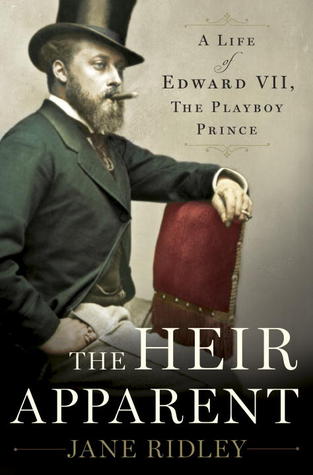
The Heir Apparent, Jane Ridley. New York: Random House, 2013.
Summary: An award-winning biography of Edward VII, often criticized for his faults of character as heir to the throne under Victoria, whose reign ushered in a critical transition in the British monarchy in the first decade of the twentieth century.
This biography poses the question of whether a badly-behaved individual can make a good king. Jane Ridley explores the life of Albert Edward, known as “Bertie” to those intimate with him, who lived in the shadow of Queen Victoria for six decades before accessed to the British throne in the last decade of his life as Edward VII.
Ridley used access to Royal Archives and extensive research to write what may be the definitive biography of Edward VII. She traces his childhood, and the strict regime and moral rectitude of Albert and Victoria that proved singularly unhelpful. He was lax and undisciplined in his studies, hated reading (even as an adult the most he read were novels when ill), and incurred his parents disapproval. This worsened as he matured. His “fall” with actress Nellie Clifden broke his father’s heart and Victoria blamed his death, coming soon after on Bertie.
His response was to become a womanizer. He had a succession of affairs and mistresses, chronicled at length, though with restraint. This continued throughout his marriage to Alexandra and included actress Lillie Langtry, Jennie Churchill, socialist Daisy Warwick, and “royal mistress” Alice Keppel (great-grandmother of Camilla Parker Bowles!). When he accessed to the throne, he was dubbed “Edward the Caresser.”
Victoria more or less wrote him off and tried to limit his access to official reports. So he did the social rounds to the country estates of the elite, raced horses, gambled, and ate, drank, and smoked prodigiously. He loved dressing well and expected those around him to be meticulous in their dress.
One would think such an individual would be a disaster as a king. Yet it turned out that this was not the case. After Albert’s death, Victoria became something of a recluse. Edward became the public face of the royal family, both in making public appearances throughout the country, and in tours abroad. He cultivated relationships with the royalty of Europe, most of whom were related to him in some way or another. He was known as “the Uncle of Europe” who counted Kaiser Wilhelm as nephew, and Czar Nicholas of Russia as nephew-in-law.
Edward VII became King in his sixties in 1901. He was overweight, incessantly smoked, had a cancer on his nose that was treated with radium, and already had survived several brushes with death as well as outliving siblings and some of his children. He had to postpone his coronation due to appendicitis. He probably would have been diagnosed with COPD or emphysema today. Yet he worked hard and tirelessly as King, demonstrated a “common touch” that endeared him to the people. He exercised a kind of personal diplomacy that complemented formal efforts with European heads of state, and opened the doors to an alliance with France that decisively shifted the balance of power when the war he strove so hard to avoid came. He modernized the kingship and helped redefine the idea of a constitutional monarchy before his death from severe bronchitis and heart attacks in 1910. Over 400,000 people filed past his coffin when he lay in state.
Ridley has given us a magnificent portrait of this heir and king who turned out to be far more than he appeared to be. It took a wife who looked past his womanizing, unpardonable as it was. It took mistresses who were discrete (most were). But it particularly took someone who understood what people wanted of their king, who would be the people’s king. It took someone who understood the uses and limits of his power, and exercised this to the full, both with a succession of Prime Ministers, and foreign heads of state. One wonders what he could have done had he come to the throne sooner and/or lived longer. Ridley does a great service in chronicling the life of this deeply human and under-estimated king.
The Heir Apparent was named one of the best books of the year in 2013 by The New York Times Book Review and The Boston Globe.
Reblogged this on James' Ramblings.
LikeLiked by 1 person
Thanks! Glad you liked the post.
LikeLiked by 1 person
Pingback: The Month in Reviews: April 2017 | Bob on Books
Pingback: Bob on Books 2017 Honorable Mentions | Bob on Books